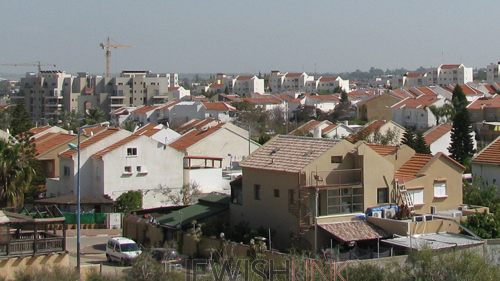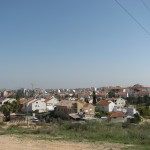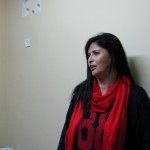
It’s a quiet day in the sandy border town of Sderot. The first day of spring brings blue skies and a warm wind as residents go about work and routine activities. Exactly one week earlier, a heavy Gaza rocket assault against southern Israel had sent residents from Ashdod to Sderot fleeing to bomb shelters. Gaza’s Islamic Jihad declared that the terror group had fired 90 rockets, while the IDF reported that 60 rockets had struck Israel in the two-day period, with five hitting populated areas including near a library in Sderot and a gas station in the Negev.
The 16-month calm in the region had given southern Israelis a chance to return to normal life, following the week in November 2012 during Operation Pillar of Defense when Gaza terror groups fired more than 1,500 rockets including Iranian-made Fajr-5 missiles at Israeli cities.
Dorit Barzilai, a baker in a Sderot supermarket told Tazpit News Agency on Thursday that the rocket attacks from the previous week had scared her. “I had the day off on Wednesday or I don’t know how I would have managed baking in the kitchen with the sirens and rockets,” she said.
For Sderot resident, Adi Turgeman, 19, the rocket siren in Sderot had caught her in the shower.
“I’m conditioned to this but it isn’t easy to get back to the routine,” she said. “I heard the siren in the middle of the shower and I just got down to the floor. I could hear what sounded like the Iron Dome intercepting a rocket in the background, while my family was yelling at me to come to the shelter.”
Turgeman was only four-years-old when the rocket fire from Gaza began targeting her city. “When I was kid, I couldn’t fall asleep unless my mom came to sleep with me. Sometimes she would play music to calm me at night. It wasn’t easy to grow up this way,” she said.
Two years ago, Turgeman, then a high school student was set to take a Bagrut exam, the matriculation tests that are given in order to graduate from Israeli high schools. “I am a serious student and I knew all the material by heart. But the day before the exam, there were a number of rocket attacks on Sderot. I got to the exam the next day in a nervous wreck – and the grade I got was a 50,” she recalls.
But Turgeman, who is doing a year of national service in Sderot, maintains an optimistic attitude. “You just have to keep going with life, even with a week like last week.”
“I could never imagine living anywhere else other than my hometown,” she adds quietly.
Eli and Rachel Assayag have been living in Sderot for six decades and made aliyah to Israel from Marrakesh, Morocco in the 1950s. They own a local Sderot restaurant, which they have been running for the past 40 years, serving home-cooked Moroccan dishes.
“The rocket attacks last week didn’t scare us,” Eli, 67, told Tazpit. “We have faith and therefore we are not afraid. We believe that God protects us. The restaurant is always open- it doesn’t matter how many rockets Hamas fires at our city.”
But for Hanita, a 46-year-old Sderot mother, the rocket attacks were frightening both for her and her son, who is in the second-grade. “My son didn’t want to leave the house on Purim. He just wanted to stay in the bomb shelter – it’s the room he feels the safest in both during times of quiet and during rocket terror,” she said.
According to Noam Bedein, the director of Sderot Media Center, since Israel disengaged from the Gaza Strip nearly nine years ago, 20,000 rockets have been fired at the Jewish state. “The rocket attacks since Israel pulled out of Gaza in 2005 have been never-ending,” he said. “It’s a reality that continues to affect more and more Israelis with passing each year.”
By Anav Silverman
Tazpit News Agency


